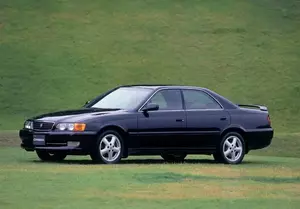
| Vehicle | Precise engine size | Difference from world average | Engine size to consumption ratio | Horsepower from 1 L | Engine size to 100 kg of weight |
|---|---|---|---|---|---|
| 2.5 i 24V Avante |
2.49 L (2491 cc) |
6.2% bigger | - | 72 hp from 1 L | 178 cc to 100 kg |
| 2.5i 24V Twin-turbo |
2.49 L (2492 cc) |
6.2% bigger | 89 cc to 1 mpg | 112 hp from 1 L | 166 cc to 100 kg |
| Vehicle | 2.5 i 24V Avante |
|---|---|
| Precise engine size | 2.49 L (2491 cc) |
| Difference from world average | 6.2 bigger |
| Engine size to consumption ratio | - |
| Horsepower from 1 L | 72 hp from 1 L |
| Engine size to 100 kg of weight | 178 cc to 100 kg |
| Vehicle | 2.5i 24V Twin-turbo |
| Precise engine size | 2.49 L (2492 cc) |
| Difference from world average | 6.2 bigger |
| Engine size to consumption ratio | 89 cc to 1 mpg |
| Horsepower from 1 L | 112 hp from 1 L |
| Engine size to 100 kg of weight | 166 cc to 100 kg |

| Vehicle | Precise engine size | Difference from world average | Engine size to consumption ratio | Horsepower from 1 L | Engine size to 100 kg of weight |
|---|---|---|---|---|---|
| 1.8 i 16V XL |
1.84 L (1839 cc) |
21.6% smaller | 53 cc to 1 mpg | 65 hp from 1 L | 141 cc to 100 kg |
| 2.0i 24V |
1.99 L (1988 cc) |
15.3% smaller | 60 cc to 1 mpg | 68 hp from 1 L | 153 cc to 100 kg |
| 2.5 i 24V Avante |
2.49 L (2491 cc) |
6.2% bigger | - | 72 hp from 1 L | 178 cc to 100 kg |
| 3.0 i 24V Avante |
3 L (2997 cc) |
27.7% bigger | 111 cc to 1 mpg | 73 hp from 1 L | 214 cc to 100 kg |
| Vehicle | 1.8 i 16V XL |
|---|---|
| Precise engine size | 1.84 L (1839 cc) |
| Difference from world average | 21.6 smaller |
| Engine size to consumption ratio | 53 cc to 1 mpg |
| Horsepower from 1 L | 65 hp from 1 L |
| Engine size to 100 kg of weight | 141 cc to 100 kg |
| Vehicle | 2.0i 24V |
| Precise engine size | 1.99 L (1988 cc) |
| Difference from world average | 15.3 smaller |
| Engine size to consumption ratio | 60 cc to 1 mpg |
| Horsepower from 1 L | 68 hp from 1 L |
| Engine size to 100 kg of weight | 153 cc to 100 kg |
| Vehicle | 2.5 i 24V Avante |
| Precise engine size | 2.49 L (2491 cc) |
| Difference from world average | 6.2 bigger |
| Engine size to consumption ratio | - |
| Horsepower from 1 L | 72 hp from 1 L |
| Engine size to 100 kg of weight | 178 cc to 100 kg |
| Vehicle | 3.0 i 24V Avante |
| Precise engine size | 3 L (2997 cc) |
| Difference from world average | 27.7 bigger |
| Engine size to consumption ratio | 111 cc to 1 mpg |
| Horsepower from 1 L | 73 hp from 1 L |
| Engine size to 100 kg of weight | 214 cc to 100 kg |

| Vehicle | Precise engine size | Difference from world average | Engine size to consumption ratio | Horsepower from 1 L | Engine size to 100 kg of weight |
|---|---|---|---|---|---|
| 1.8 |
1.84 L (1838 cc) |
21.7% smaller | - | 57 hp from 1 L | - |
| 1.8i |
1.84 L (1838 cc) |
21.7% smaller | - | 57 hp from 1 L | - |
| 2.0i |
2 L (1998 cc) |
14.8% smaller | - | 68 hp from 1 L | - |
| 2.4 DT |
2.45 L (2446 cc) |
4.3% bigger | - | 38 hp from 1 L | - |
| Vehicle | 1.8 |
|---|---|
| Precise engine size | 1.84 L (1838 cc) |
| Difference from world average | 21.7 smaller |
| Engine size to consumption ratio | - |
| Horsepower from 1 L | 57 hp from 1 L |
| Engine size to 100 kg of weight | - |
| Vehicle | 1.8i |
| Precise engine size | 1.84 L (1838 cc) |
| Difference from world average | 21.7 smaller |
| Engine size to consumption ratio | - |
| Horsepower from 1 L | 57 hp from 1 L |
| Engine size to 100 kg of weight | - |
| Vehicle | 2.0i |
| Precise engine size | 2 L (1998 cc) |
| Difference from world average | 14.8 smaller |
| Engine size to consumption ratio | - |
| Horsepower from 1 L | 68 hp from 1 L |
| Engine size to 100 kg of weight | - |
| Vehicle | 2.4 DT |
| Precise engine size | 2.45 L (2446 cc) |
| Difference from world average | 4.3 bigger |
| Engine size to consumption ratio | - |
| Horsepower from 1 L | 38 hp from 1 L |
| Engine size to 100 kg of weight | - |